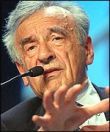Wiesel says world must act now on Darfur
Sept 14, 2006 (WASHINGTON) — For Holocaust survivor and Nobel laureate Elie Wiesel, Darfur is the “capital of human suffering” and he is perplexed why world leaders are standing by, as they did in Rwanda, while genocide took place.
 Outraged by Sudan’s refusal to accept a U.N. force to end the violence in Darfur, Wiesel was appealing to the United Nations on Thursday, along with actor George Clooney.
Outraged by Sudan’s refusal to accept a U.N. force to end the violence in Darfur, Wiesel was appealing to the United Nations on Thursday, along with actor George Clooney.
“I will be pushing for stopping the murder, the humiliation, the starvation of the victims in Darfur,” said Wiesel in an interview before addressing the Security Council.
“I call Darfur the capital of human suffering. To ignore it would be an insult to our collective conscience,” he added.
Tens of thousands have been killed and 2.5 million people forced from their homes in 3 1/2 years of fighting in Sudan’s remote western area of Darfur. Humanitarian workers have also come under greater attack in recent months.
Last month, the U.N. Security Council passed a resolution for a 20,000-member force to take over from struggling African Union peacekeepers when their mandate expires in two weeks.
Despite world pressure, Sudan is balking at the idea of a U.N. force and says the African Union has no authority to transfer its mission to the United Nations.
Wiesel said he would push the council to intervene.
He drew parallels to Rwanda’s 1994 genocide, when the world intervened too late.
“Rwanda is always on my mind when I speak of Darfur. We could have saved 600,000 to 800,000 men, women and children there but we didn’t. Now, those who didn’t will bear the responsibility for that for years and years and generations to come,” he added.
U.N. Secretary-General Kofi Annan, who was in charge of U.N. peacekeeping operations at that time, has acknowledged the United Nations failed Rwanda during the genocide.
The United States, which classified Darfur’s conflict as genocide two years ago, hopes Sudan will at the last minute concede to a U.N. force and has said repeatedly that U.N. forces will not “shoot their way” into Darfur.
But Wiesel said whether Sudan agreed or not, there must be an international force in Darfur. If the AU pulled out, the security vacuum would result in slaughter, he said.
For Wiesel, getting action on Darfur is a personal mission and he identifies closely with the victims.
The 1986 Nobel Peace Prize winner was 15 years old when his family was deported by the Nazis to Auschwitz concentration camp. He lost parents and younger sister in the Holocaust.
“I am a Jew and I feel what victims feel. I felt that once upon a time,” he said. “I felt abandoned and that is why I devote myself to all these causes.
“These people have no power. We have that power and we must use it. We will continue screaming.”
(Reuters)
